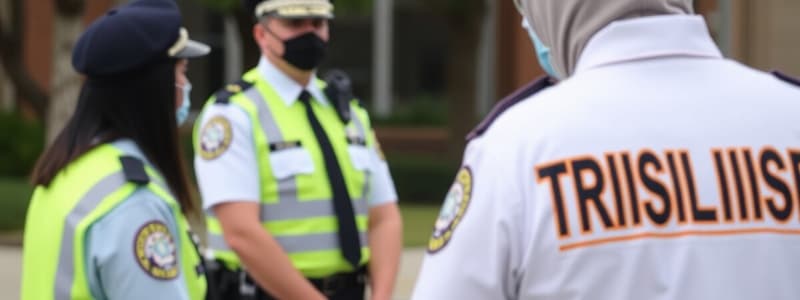Podcast
Questions and Answers
What type of training is required for officers to be part of the Crisis Intervention Team?
What type of training is required for officers to be part of the Crisis Intervention Team?
Which of the following situations necessitates the response of a Crisis Intervention Team officer?
Which of the following situations necessitates the response of a Crisis Intervention Team officer?
What is the designation for officers actively occupying a position with pay supplement within the CIT?
What is the designation for officers actively occupying a position with pay supplement within the CIT?
According to the policy, what must employees do when encountering someone who may require involuntary examination?
According to the policy, what must employees do when encountering someone who may require involuntary examination?
Signup and view all the answers
Which group is responsible for dispatching CIT officers on calls involving Ex Parte orders?
Which group is responsible for dispatching CIT officers on calls involving Ex Parte orders?
Signup and view all the answers
What should a CIT member do if they encounter a situation where behavior appears to be caused by substance use?
What should a CIT member do if they encounter a situation where behavior appears to be caused by substance use?
Signup and view all the answers
Which personnel are required to receive refresher training for crisis intervention annually?
Which personnel are required to receive refresher training for crisis intervention annually?
Signup and view all the answers
What action is required for a CIT officer to modify a signal 44 to a signal 56?
What action is required for a CIT officer to modify a signal 44 to a signal 56?
Signup and view all the answers
Which of the following behaviors is NOT typically associated with signs of mental illness?
Which of the following behaviors is NOT typically associated with signs of mental illness?
Signup and view all the answers
In the absence of an active CIT member, which of the following personnel can handle a call involving a Baker Act?
In the absence of an active CIT member, which of the following personnel can handle a call involving a Baker Act?
Signup and view all the answers
Which behavior should be avoided when interacting with a mentally ill person to prevent escalating the situation?
Which behavior should be avoided when interacting with a mentally ill person to prevent escalating the situation?
Signup and view all the answers
What is a common characteristic that a mentally ill person may exhibit?
What is a common characteristic that a mentally ill person may exhibit?
Signup and view all the answers
What is the recommended first step for sworn personnel when determining that an individual meets Baker Act criteria?
What is the recommended first step for sworn personnel when determining that an individual meets Baker Act criteria?
Signup and view all the answers
What should civilian employees do when feeling threatened by a mentally ill individual?
What should civilian employees do when feeling threatened by a mentally ill individual?
Signup and view all the answers
Which approach is essential when interacting with a mentally ill person to maintain effective communication?
Which approach is essential when interacting with a mentally ill person to maintain effective communication?
Signup and view all the answers
Study Notes
Miami Police Department Crisis Intervention Team
- Departmental Order 11, Chapter 11 outlines policy and procedures for the Miami Police Department's Crisis Intervention Team (CIT). The CIT is a component of the Patrol Section, staffed by officers, sergeants, and lieutenants who have completed a 40-hour Crisis Intervention Training program.
- Purpose of the CIT: To implement a humane approach to individuals experiencing mental illness or emotional disorders.
- Responsibilities: CIT officers promptly respond to calls involving persons with emotional disorders or mental illness, including calls concerning Ex Parte orders, suicidal threats, and involuntary examinations (Baker Act).
- Procedures:
- Summon a CIT officer: Whenever an officer encounters a person who appears to meet the involuntary examination criteria.
- Maintain a professional demeanor: When interacting with individuals with mental illness or emotional disorders.
- CIT Report: The CIT member or patrol officer handling a Baker Act signal 56 will complete a CIT report.
- Training Requirements: All sworn agency personnel receive entry-level Crisis Intervention training during the Basic Law Enforcement course. Annual refresher training is required for both sworn and non-sworn personnel, including Communications, Crime Scene Investigation, and Public Service personnel.
- Recognizing Mental Illness: Signs and symptoms of mental illness include strong and unrelenting fear of people, places, or things, inappropriate behavior, frustration in new circumstances, and aggressive behavior.
- Guidelines for sworn personnel:
- Request a CIT officer or backup.
- Calm the situation by assuming a quiet, non-threatening manner.
- Provide reassurance and help.
- Obtain information from others to assist in communication.
- Avoid verbal threats of arrest.
- Avoid topics that may agitate.
- Be truthful.
- Remove themselves from threatening situations and summon assistance.
- Assist civilian employees in obtaining information.
- Guidelines for civilian employees:
- Retreat from threatening situations and summon assistance.
- Request a CIT officer to assist in obtaining information or cooperation.
- Communications operators will adhere to established procedures for dealing with callers suspected of suffering from mental illness.
Involuntary Examinations and Transport of Individuals (Baker Act)
- Departmental Order 11, Chapter 12 ensures the protection of individual dignity for persons suffering from emotional disorders or mental illness, including during custody, detention, and transport.
- Types of Admission to a Receiving Facility:
- Emergency Admission (Involuntary Admission).
- Voluntary Admission.
- Ex-Parte Order.
- Involuntary Admission: A sworn officer will take a person who meets the involuntary examination criteria into custody and transport them to the nearest receiving facility.
- Ex-Parte Order: A CIT officer will be dispatched to the location, and a backup unit is necessary unless the CIT is a two-member team.
- Entering Premises: An officer acting under an Ex-Parte order may use reasonable force to gain entry to premises to take custody of the subject.
- Persons with Criminal Charges: Mentally ill individuals meeting Baker Act criteria who are arrested for Domestic Violence or any felony charge will be transported directly to the Miami-Dade County Corrections Facility.
- Physically Injured Persons: Miami Fire Rescue will be summoned to render first aid and transport the individual to a hospital or emergency room.
- Handling of Persons:
- Treat persons with courtesy, consideration, and dignity.
- Use necessary measures for protection if the person indicates a risk of harm to themselves or others.
- Avoid making comments about their emotional condition.
- Handcuff adults and juveniles (except for juveniles aged 12 and under unless they pose a safety threat).
- Transport juveniles restrained by a safety belt.
- Receiving Facilities: Individuals suffering from mental illness will be transported to the nearest mental health receiving facility. Violent or intoxicated mentally ill persons will be transported to Jackson Memorial Hospital's Crisis Intervention Unit.
Substance Abuse Services (Marchman Act)
- Departmental Order 11, Chapter 13 outlines the policy and procedures for diverting substance abuse impaired persons from the criminal justice system to the social health system.
- Responsibilities: Members are responsible for understanding the nature of alcoholism and drugs as defined in the order.
- Procedures: Members may take a person into custody when the criteria for examination are met in one of the following situations:
- Voluntary Treatment.
- Involuntary Treatment Petition Process.
Handling Undocumented Individuals within Miami-Dade County Jail
- Departmental Order 11, Chapter 14 provides detailed guidance for managing individuals in Miami-Dade County jail who are suspected of illegal immigration status.
- Booking Procedure: Information from immigration documents will be placed on the prisoner as part of a criminal investigation and impounded.
- Officer Responsibilities: Officers must notify INS/Border Patrol if probable cause exists to arrest and there's a reasonable suspicion of criminal activity unrelated to immigration status.
- Duration of Detention: The duration of any stop or detention prior to release to INS/Border Patrol must adhere to Florida’s Stop and Frisk Laws and departmental procedures.
- Transporting Undocumented Individuals: Officers generally are prohibited from transporting undocumented persons to INS/Border Patrol solely for purposes of release, except where there is inherent danger to citizens requiring immediate action.
- Facility Usage: The order clarifies use of facilities for holding or transferring undocumented individuals.
- Border Patrol Involvement Restrictions: Officers are prohibited from involving Border Patrol in cases involving victims/witnesses of a crime, family disturbances, minor traffic offenses, or individuals seeking medical treatment.
- Labor Pools: Officers are prohibited from detaining undocumented persons for INS/Border Patrol unless there is probable cause to arrest for a crime unrelated to immigration.
Studying That Suits You
Use AI to generate personalized quizzes and flashcards to suit your learning preferences.
Description
This quiz focuses on Departmental Order 11, Chapter 11, which outlines the policies and responsibilities of the Miami Police Department's Crisis Intervention Team (CIT). It covers the humane approach taken towards individuals experiencing mental illness and the procedures required for responding to related incidents.




